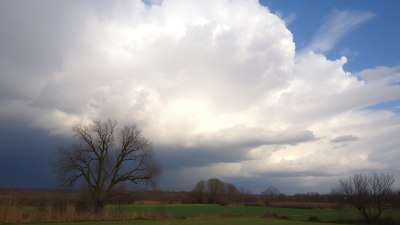Why the Weather Gets Better the Second You Commit to a Lazy Day
Discover the phenomenon of improved weather on lazy days and its psychological effects.

Image by pvproductions on Freepik
Have you ever noticed that the moment you decide to take a lazy day, the weather seems to change for the better? It’s as if the universe knows and conspires to reward your decision to relax. This curious phenomenon has been a topic of discussion among friends, family, and colleagues who have all experienced this uncanny coincidence. But is there a scientific explanation for it, or is it just a figment of our imagination? In this article, we’ll explore various aspects of this phenomenon—from psychological effects to environmental influences—and unveil the reasons why the weather often appears to be better when you commit to a day of leisure.
The Psychological Perspective
One possible reason for the perceived improvement in weather is our psychology. When you decide to have a lazy day, you often release yourself from stressors and commitments, leading to a more positive mood. This uplifted mood can make you more receptive to the beauty of your surroundings. For example, if it’s slightly overcast but you’re enjoying a day off, your relaxation allows you to notice the charm of the clouds, the sound of rain, or a cool breeze, which you might generally overlook when you’re busy and stressed. Thus, your mental state can significantly alter how you perceive the weather.
Confirmation Bias
Another psychological concept that plays a role here is confirmation bias. When you have a lazy day, and the weather improves, you’re likely to remember that instance and reinforce the notion that this correlation exists. Conversely, if you had a lazy day and it rained, you might not give it as much thought. Our brains are wired to seek patterns, and once you establish a belief that good weather follows a lazy day, you may unconsciously begin looking for confirmation. Over time, this perception solidifies into a belief, feeding the cycle of expectations and experiences.
Environmental Influences
Outside of our psychology, there may be real environmental factors at play as well. When people are busy—working or commuting—the weather conditions might feel harsher. The stress of traffic, deadlines, and responsibilities can overshadow the beauty of a sunny day or a refreshing rain shower. Conversely, during a lazy day, you might find yourself more attuned to subtle changes in the environment, such as the warmth of sunshine filtering through the clouds or the invigorating smell of fresh rain. This heightened awareness might lead to a perception that the weather is indeed better than it typically is.
The Role of Expectations
Expectations also play a crucial role in our experiences. When you plan to spend a day lounging, you might subconsciously anticipate a beautiful day. This expectation often influences your mood and shape your perception. If you wake up to find sunny skies and gentle breezes on a day you had designated for relaxation, it only amplifies your positive feelings about your decision to unwind. Expectation can powerfully affect your experience; much like how a vacation may seem pleasant because you looked forward to it for a long time. The combination of anticipation and enjoyment reinforces your perception of that day as special.
Weather Patterns and Trends
Weather patterns can also contribute to this phenomenon, albeit indirectly. Often, people commit to lazy days on weekends, when weekends are statistically more likely to have pleasant weather in various regions. Seasonal cycles can also play a role—imagine committing to a lazy beach day in the summer versus a cozy indoor day in winter. On weekends, the environment may align more favorably with your plans, resulting in clearer skies and milder temperatures. For instance, research indicates that people's moods tend to improve when they experience good weather on weekends, and the correlation seems strong in many places. Thus, it may not be just a coincidence that your lazy days align with beautiful weather.
The Influence of Social Media
In today’s digital age, social media can amplify our perceptions of good weather. With platforms overflowing with picturesque images of blue skies, sunny beaches, and vibrant sunsets, we become more aware of favorable weather conditions. When you’re spending a lazy day indoors and you see a friend’s post about their perfect sunny day at the park, it may trigger feelings of envy and longing for the outdoors. These feelings can distort your perception of the day, amplifying your sense that you’re missing out on favorable weather when you’re actually enjoying your personal version of a perfect day.
The Connection to Nature
Connecting with nature can significantly enhance well-being, and taking a lazy day often gives individuals that chance. Whether it’s lounging outside with a book or simply sipping coffee on the porch, moments spent in nature can transform your perception of the environment around you. The simple act of giving yourself permission to slow down creates a space for you to appreciate the weather, whatever it may be—sun, clouds, or even rain. When you’re not in a rush, you begin to notice the beauty in every small detail: the sound of raindrops, the gentle rustle of leaves, or the warmth of the sun on your skin.
Embracing the Serenity of a Lazy Day
Ultimately, embracing a lazy day creates an opportunity to reconnect with yourself. The pressures of work, family, and daily responsibilities can leave little room for self-care. Choosing to take a step back and indulge in a day of leisure may send a ripple effect through your mood and perspective. Much like the weather, your emotional landscape shifts; the sun shines brighter, and all seems right in the world. The notion that better weather accompanies a lazy day may not be entirely unfounded. It reflects a beautiful interplay between your mental state, expectations, and the environment that ultimately culminates in a more vibrant experience.
A Conclusion on the Weather Phenomenon
In conclusion, the phenomenon of improved weather on lazy days is a rich tapestry of psychological and environmental influences. While there may be no concrete scientific evidence proving that the weather objectively gets better the moment you decide to relax, the subjective experience is perfectly valid. The interplay between mental attitude, expectation, and the environmental context creates a unique experience where weather perception morphs into a more positive lens. So next time you commit to a lazy day, cherish that moment; it just might become the most pleasant day of the week—weather included.











